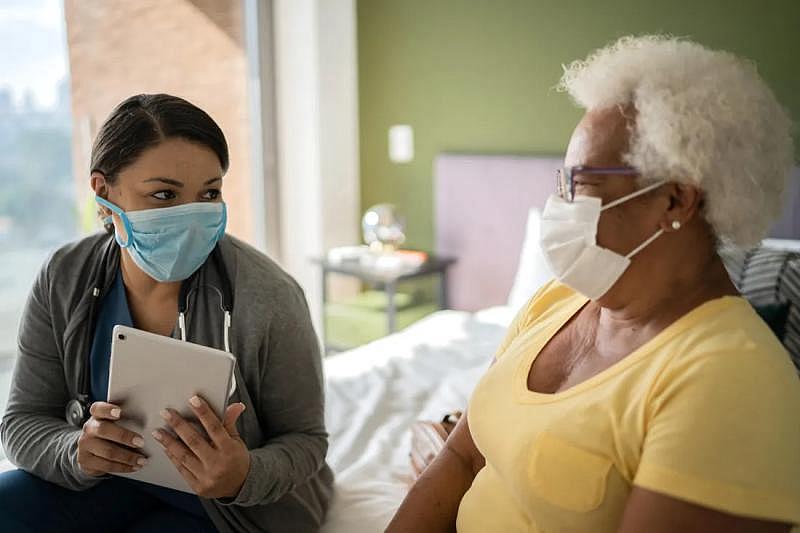Guide to nursing homes: How to choose the right home for a loved one in three steps
This story was originally published in USA Today with support from our 2021 National Fellowship.

Getty Images
Choosing a nursing home for a loved one can be daunting and time-consuming. Experts say you should break it down, beginning with deciding whether a nursing home is the right fit, or whether this is the right time. Seniors may be better off with home-based or community-based care, housekeeping or meal services or adult day programs, for instance.
Housing for those 55 and up could provide the setting a senior may need to live independently without much extra care. Assisted living facilities with meals or a la carte health services may also provide enough care for someone needing help.
Once health conditions call for full nursing care, the length of the stay will help determine where to start your research, said Vince Mor, a professor at the Brown University School of Public Health.
“If you’re searching for rehabilitation or post-acute care for a stroke or a broken hip after a hospital, you will be looking at a different set of criteria than a long-term stay,” Mor said.


GETTY IMAGES
Family seeking top facilities for such post-acute care should first visit the Centers for Medicare and Medicaid Services' Care Compare website to look at the volume of Medicare versus Medicaid funding for the home. Those receiving more Medicare are likely to specialize in rehab, with more therapists. Family also may be more interested in reviewing the facilities’ rehospitalization rates for residents' so-called rehabilitative stays.
Long-term-stay decisions should be based on a wide analysis of all the quantitative data available online, mixed with qualitative in-person information.
“Once you get to the point where you can’t get out of bed alone, do the cooking, dressing or go to the toilet, it’s likely you’ll need more care on an ongoing basis,” Mor said. “The same facility that does great rehab work with Medicare patients might not be the best place to remain.”
1. Do your homework
Because nursing homes are federally regulated, they are under more scrutiny, producing reports to the federal government that feed the Care Compare site. Some of that information is self-reported, while other information is drawn from algorithms that rank key metrics. Some comes through in-person inspections by auditors.
Experts pointed to Care Compare as the first stop for key metrics such as staffing levels and infection control. New data points have been added during the pandemic to help consumers, including vaccination status for residents and staff and death data during outbreaks. USA TODAY released a new tool that uses federal data and a government formula to rank nursing home performance at the height of the pandemic last year.
Lookup:How did your nearby nursing home perform in the fatal COVID-19 surge?
Other independent news agencies like ProPublica provide search tools on their websites that can be helpful, said Bob Stephen, vice president of health and caregiving at AARP. His agency hosts a nursing home guide and “10 questions to ask” feature on its website.
Local aging agencies often provide resources, too. Some state health departments gather data on skilled nursing facilities and post them online. Ombudsmen in each state serve as liaisons between residents and facilities and often offer resources on choosing homes.
Stephen warned that people should be cautious when searching sites and services that include a limited view of homes based on whether a facility is a member of a specific organization, and wary of those that receive a commission for landing residents.
“I’d be a little wary of online reviews being authentic and cautious about giving out your information because you’ll be solicited – and with organizations with financial ties to the ranking sites, you can imagine there being some conflict,” Stephen said.
The American Health Care Association, the main industry group for for-profit nursing providers nationwide, hosts a site, OurSeniorCare.org, with resources from its member facilities and a checklist of questions to ask operators.
2. Ask people you trust
Families should collect qualitative advice about their nursing home decision, said Toby Edelman, a senior policy attorney with the Center for Medicare Advocacy.
“Look around your network and who you know, think about asking your church or someone you know who had actual experience at these facilities,” Edelman said.
Edelman said the statistics and reports offered online for a nursing home can be out of date as well. Conditions could change rapidly with new directors, new owners or different staff. She recommended looking for patterns over time and then consulting people with firsthand experience with the facility.
Likewise, Edelman said the Centers for Medicare and Medicaid Services star ratings and inspection citations often don’t reflect the maximum penalty for serious problems and routinely describe issues as “no harm” when the reality is more complex.
3. Visit in person and use your senses
Data rankings, homework and advice should always be accompanied by in-person visits, said Lori Smetanka, executive director of the National Consumer Voice for Quality Long-Term Care, a group that advocates for consumers of long-term care.
Full in-person tours were restricted during much of the coronavirus pandemic but are slowly returning. During a visit, family should use all of their senses.
“What are you seeing and hearing? Are residents calling out? Are you hearing appropriate music? Are staffing levels posted? And what are the staff interactions like with residents?” Smetanka said.
Experts caution that you should not to be distracted by the “chandelier effect” of fancy furnishings that don’t always translate to quality care. Family can pay attention to small details: Are residents well-groomed and engaged, or do they appear comfortable? Do staff members refer to residents by name?
Smetanka said visits help answer not only questions about physical needs but also about support for residents' emotional well-being.
“You can be asking questions like: What kinds of activities do you have here? How do you arrange for outings outside and if people want to get out in the community?” Smetanka said. “Is there an expectation that family can visit at any time? It would be a red flag for me if they restricted visitors to certain hours at this point.”
And after gathering as much information on the facility as possible, Smetanka said, cost will inevitably need to be considered. The 2021 median cost for a private room in a nursing home was $9,034 a month, according to the Genworth Cost of Care Survey.
Generally, Medicare pays for up to 100 days of rehabilitation in nursing homes. Then Medicaid can be used, but it comes with complex eligibility requirements, and seniors may need to tap into private funds.
Nick Penzenstadler is a reporter on the USA TODAY investigations team. Contact him at npenz@usatoday.com or @npenzenstadler, or on Signal at (720) 507-5273.


